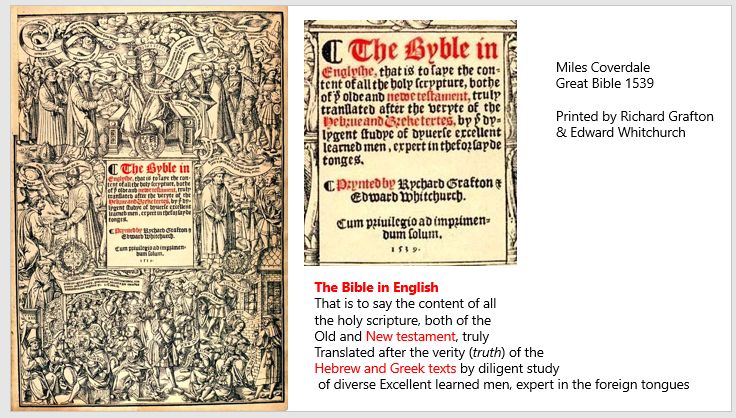

 |
Page
35
|
| The first English translation of the whole bible
was produced by Miles Coverdale and known as the Great Bible. This was commissioned
by Thomas Cromwell in 1538 and was the first Bible in English to be authorised
for use in Church. This was the Bible of Henry VIII and Elizabeth I. Most
of the population were church goers and heard this read out day after day
and the rhythms and poetry of the bible became part of the minds and national
identity of the English. From 1538, every parish in England was required
by law to purchase a copy of an English Bible and place it in ‘some
convenient place’ for all to see and read. In 1611, King James the First authorised a new translation that became known as the Authorised King James Bible. Nevertheless, much of this still reflected the Tyndale bible using ye instead of you, thou for you, gat for got, spake for spoke. These forms were no longer used in everyday speech but were retained to lend the Bible an ancient authority and those of us who were brought up on this feel its loss in modern translations of the Bible. In opposition to Catholic beliefs, Humanists such as Erasmus and Protestants firmly believed people should read the Bible for themselves and communicate directly with God rather than through a priest. For this, accurate translations were required. Erasmus went back to the earliest sources of the Greek Bible he could find and translated it into Latin. Protestant reformers like Tyndale then translated this into English. As literacy spread so did the demand for books in English, of all types. The Renaissance became a time of scholarship rediscovering the texts of the ancients: Philosophers like Aristotle, Plato, Socrates, Ovid etc. Many of these texts had been all but lost but survived in Arabic translations. These could now be widely read in English for the first time. Scientific texts appeared in English print and were much more accurate than the hand-written manuscript versions as most copyists had no scientific knowledge so did not know when they were making mistakes. This is the legacy of the printed book. |